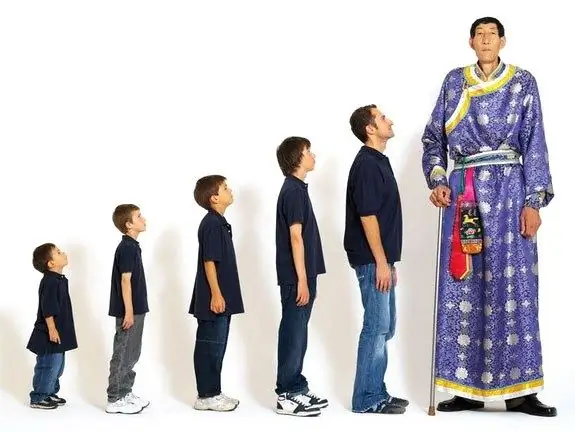- Author Nora Macey [email protected].
- Public 2023-12-16 10:17.
- Last modified 2025-01-23 08:47.
People are often interested in the question - when a person stops growing, and what factors affect his growth. Usually people grow up short or tall depending on their early childhood diet and genetic potential, however there are other reasons that can affect a person's growth and cessation.

Why do people grow up or stop doing it
Children born to tall parents most often grow up tall - provided that proper nutrition is followed. In addition, nature lays a growth program in the body of every person. If a person grows rather short, it means that this program has not been fully implemented by the body. Its failure can be affected by the slightest changes in DNA, poor ecology, poor nutrition, intrauterine malformations and hormones.
Failures in the growth program can cause not only its underdevelopment - some people, on the contrary, grow to a mark of more than 2 meters.
The most intensive human growth is observed during pregnancy, therefore, any damage to the placenta can lead to malnutrition of the fetus and the birth of a child with low body weight and growth deficiency. In the first years and throughout the rest of life, the main regulator of growth is the endocrine system, while the hormone responsible for growth is produced by the pituitary gland. Sex hormones and thyroid hormones play an equally important role in this process.
To what age does a person grow: how long and when does he stop?
Despite all the generally accepted schedules and schemes that provide for the stability and gradual progress of growth, children most often grow in "leaps", which alternate with rather long pauses. There are three known stages at which a person grows most intensively - this is the 1st year, 4-5 years and puberty (puberty). At this time, the body is working at full strength, so children are more likely to get sick and suffer from functional disorders of organs and systems.
With a decrease in the rate of growth, the body enters a phase of tranquility, and the internal organs begin to develop calmly.
During puberty, girls (11-12 years old) begin to dramatically increase in height from 6 to 11 centimeters, adding on average up to 8 centimeters per year. Boys enter puberty a little later (13-14 years old), so their increase in height is from 7 to 12 centimeters - on average, 9.5 centimeters per year. By the age of 15, most girls reach their final height, while boys finally grow up by 19-20 years. However, a person, regardless of gender, continues to grow slightly after 25 years. Growth stops at about 35-40 years, after which people begin to shrink by 12 millimeters every decade - as articular and vertebral cartilage gradually dehydrates and shrinks.






